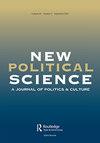The Temporality of Violence in Primitive Accumulation: A Soviet Subsidy to the Capitalist Transition
IF 0.5
Q4 POLITICAL SCIENCE
引用次数: 0
Abstract
Abstract Marx argued that transitions to capitalism require the violent dispossession of direct producers from their means of production. Many scholars have gone beyond the violence of transition to argue that state force is continuously used to maintain market relations. A major debate focuses on whether Marx’s “so-called” primitive accumulation was an historical or continuous process. This paper contributes an empirical puzzle to this debate: the dispossession of peasants across the former Soviet Union after 1991, which resulted from land privatization, was predominantly non-violent. This is due, I argue, to a temporal separation between violence, which occurred during the process of Stalinist collectivization, and the subsequent dispossession of cultivators in the 1990s. Peasant dispossession could unfold peacefully after 1991 only because historical violence was embedded in the structure of the collective farm—a structure that was maintained in the process of dispossession—thus constituting a Soviet “subsidy” to the capitalist transition.原始积累中暴力的暂时性:苏联对资本主义过渡的补贴
马克思认为,向资本主义的过渡需要暴力剥夺直接生产者的生产资料。许多学者已经超越了过渡的暴力,认为国家力量是持续不断地用来维持市场关系的。一个主要的争论集中在马克思的“所谓”原始积累是一个历史的还是连续的过程。这篇论文为这场辩论提供了一个实证难题:1991年后,前苏联对农民的剥夺主要是非暴力的,这是土地私有化的结果。我认为,这是由于在斯大林主义集体化过程中发生的暴力与随后在20世纪90年代对耕耘者的剥夺之间的暂时分离。1991年之后,农民的被剥夺得以和平地展开,只是因为历史上的暴力嵌入了集体农庄的结构中——这种结构在被剥夺的过程中得以维持——从而构成了苏联对资本主义转型的“补贴”。
本文章由计算机程序翻译,如有差异,请以英文原文为准。
求助全文
约1分钟内获得全文
求助全文

 求助内容:
求助内容: 应助结果提醒方式:
应助结果提醒方式:


